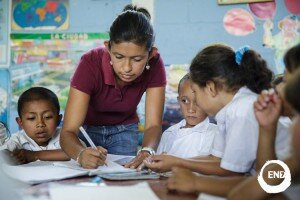
Three to four hours. That’s how long one mother was willing to walk to make sure her child attended the annual vaccination and deworming campaign in the village of Coyalito in San Esteban, Honduras.
This past April was my third trip to Honduras in the last 14 months. On my first two trips, I spent the majority of my time running between government offices and meetings – including attending the launch of the Honduras national integrated plan on neglected tropical diseases (NTDs). Honduras was the first country* in Latin America and the Caribbean region to launch such a plan – which ensures that the country is tackling all diseases at once – versus one at a time.
This time on my return to Honduras, I saw firsthand how that plan was being put into motion.
And I was amazed.
For a country facing severe challenges in security and violence, Honduras is a leader and innovator when it comes to tackling NTDs.
Three government divisions – the Ministries of Health, Education and Social Development are working together to reach people in even the most remote parts of the country. They’ve taken charge by developing working groups to tackle issues and problems they notice when bringing the programs to the community.
They’re enthusiastic. They’re driven. And I’m quite positive that they’re going to succeed.
I know this because I traveled over six hours with the Ministry of Health over unpaved and rocky roadways on their visits to various districts. Distribution was carefully arranged: a health worker used a loud megaphone to call out to members of the community to invite them to visit the vaccine and deworming campaign. From there, mothers would bring their young children to receive essential vaccines and deworming medicine.
A nurse practitioner told me that bundling healthcare delivery– such as vaccination and deworming – often encourages more families to come. Most parents know about these diseases, especially the intestinal worms. In Honduras, and many other countries in Latin America and the Caribbean, there’s a common belief that if children grind their teeth at night, they have parasites. There is a demand for deworming, and mothers came armed with their child’s immunization card and found a space to account for their child’s annual deworming treatment.
The Honduran ministries are also thinking beyond treatment for NTDs to a more comprehensive approach. These diseases are often spread due to lack of access to clean water and proper sanitation, which is a reality for some of the families in villages like Coyalito. As a result, the ministries are pushing to incorporate water filters in schools, and other sanitation initiatives which will propel these treatment programs toward long-term success.
At the end of the day, I joined the health team in brief survey to determine attendance of the campaign. We walked around each “manzana” – or block – to knock on people’s homes and ask them if children were dewormed and vaccinated. Health workers talked to them about why it’s important to attend these campaigns and have their children treated.
Among advocacy organizations, it seems that we often divvy up health issues, as if family planning, treatment for NTDs and vaccination are all independent projects. But, the reality is that often, at the point-of-care level, everything is bundled together. It’s very effective.
Our partners in Honduras want to expand this successful initiative to help many more families. END7 is asking supporters to help fill a funding gap to make sure this medicine reaches Honduran children in 20,061 schools. With your help we can reach 1.4 million school children and protect them harmful parasitic worms, including roundworm, hookworm, and whipworm.
Help us see the end of NTDs in Honduras by making a contribution. Read more about END7’s effort to raise money and support for NTD treatment in Honduras here.
*In March 2013, Brazil launched their integrated national plan, and currently several other countries have draft plans in development.


